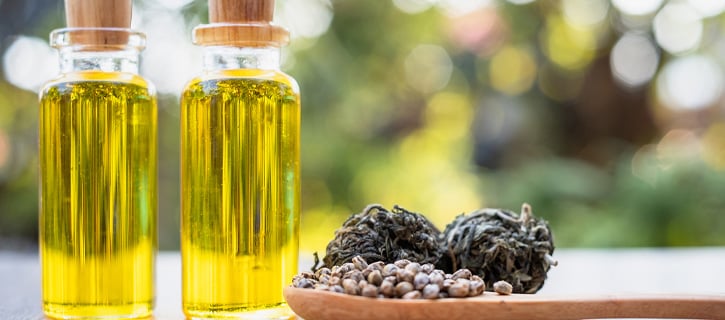National CBD Month, observed annually in January, serves as a platform to raise awareness about the benefits of cannabidiol (CBD) and its potential to promote wellness and a healthy lifestyle. As the popularity of CBD continues to soar, it's essential to not only appreciate its various uses but also to stay informed about the evolving CBD world.
Currently, there are over 100 unique cannabinoids, and the rules are always changing from one state to another. Companies in the health, nutrition, and pharmaceutical industries are constantly working on developing new products with cannabinoids. Making sure that insurance for CBD companies provides adequate coverage in terms of product safety and testing is important to keep things running smoothly in this fast-paced environment.
Here are a few examples of the latest trends:
CBD Integration in the Food and Beverage Industries
We have seen an increase in CBD being integrated into various food and beverage products. This is primarily due to consumer demands, advanced technology, and CBD’s potential health benefits. Regulatory requirements can vary by state, so it is crucial for businesses and restaurants to comply with local laws and other regulatory entities when adding CBD to their products.
Examples of these integrated products include:
- CBD-infused beverages: CBD-infused water, teas, coffees, sodas, energy drinks, and functional beverages.
- CBD-infused snacks: gummies, chips, popcorn, protein bars, chocolate bars, lollipops, and other candy.
- CBD-infused baked goods: cookies, brownies, muffins/pastries.
- CBD-infused cooking oils: infused olive oils, coconut oils, avocado oil, coconut butter.
- CBD-infused condiments and dressings: salad dressings, hot sauces, and condiments.
Emphasis on Third-Party Lab Testing
Third-party lab testing for CBD products is very important and helps to ensure product safety, quality, and compliance with regulators. Testing considers the concentration of cannabinoids to ensure that the product contains the stated amounts and meets legal limits for THC content. It also provides consumers with confidence in the purity, quality, and safety of CBD products.
Testing helps guarantee that products contain the advertised amount of CBD and other cannabinoids, are free from harmful contaminants, and comply with regulatory requirements. Screening for contaminants such as pesticides, heavy metals, residual solvents, microbial impurities, and mycotoxins is crucial in confirming products are safe for consumption.
Many jurisdictions also require third-party lab testing as a legal requirement for CBD products entering the stream of commerce.
Human Clinical Trials with CBD Treatments
Human clinical trials involving CBD treatments are conducted to evaluate the safety, efficacy, and potential therapeutic applications of CBD to address and treat various medical conditions.
Clinical trials are helpful in not only finding cures but also in assessing the safety of ingesting CBD. Human clinical trials test for potential side effects, drug interactions, and long-term effects on organ function and overall health. Understanding the safety profile of CBD is critical for potential future medical applications.
Examples of clinical trials include:
- CBD trials for epilepsy, chronic pain, anxiety disorder, social anxiety disorder, post-traumatic stress disorder (PTSD), schizophrenia, substance use disorders, and other neurological and psychiatric disorders. The research industry is also investigating CBD's potential in managing symptoms associated with cancer and inflammatory conditions. One of the most well-known CBD research involves treating epilepsy, particularly Dravet syndrome and Lennox-Gastaut syndrome.
- Other trial applications include pain management to include neuropathic pain, inflammatory pain, and pain associated with multiple sclerosis.
Related: Clinical Trial Coverage for Health, Nutrition, & Lifestyle Companies
Advancements in CBD Nanoencapsulation
Nanoencapsulation of CBD is a process where nanoparticles are used to encase and protect the CBD to improve the stability, solubility, bioavailability, and release rate of the CBD in the human body.
Improved bioavailability means that a higher proportion of the administered CBD dose enters the system and releases its therapeutic effects. This can lead to more efficient use of CBD and potentially lower the required dosages. Enhanced stability protects CBD from degradation and improves its stability, resulting in longer shelf life and improved product quality. This new nano-technology enables the targeted delivery of CBD to specific tissues or cells within the body. This targeted delivery may be helpful in treating localized pain, inflammation, or other specific conditions.
From a human clinical trial perspective, nanoencapsulation offers the opportunity to combine CBD with other active ingredients, terpenes, and traditional drugs within a single formulation. This may lead to the discovery of new medical treatments in the future. Ongoing research in CBD nanoencapsulation continues to explore new encapsulation techniques, carrier materials, and delivery systems to optimize CBD’s potency.
Customized CBD ProductsCustomized CBD products in the marketplace cater to the specific preferences and needs of the consumers. These products are often tailored to offer personalized experiences, dosage options, and targeted effects.
Examples of these customized products include:
- Customized CBD oil tinctures or capsule blends where they combine CBD with other botanical extracts, vitamins, or supplements. Customers can personalize their capsules or tinctures by selecting specific ingredients to address their unique wellness goals.
- Custom-infused topical products like CBD-infused creams, lotions, or balms. Customers can add specific essential oils, herbal extracts, or additional active ingredients to a variety of delivery systems to tailor the product to their preferences to address their health or skincare needs.
- Customized CBD edibles, such as gummies or chocolates, offer a range of preferred flavors and dosage strengths.
- Customized CBD pet products, which are on the rise. Pet owners can personalize the CBD concentration, flavors, and formulations to address specific health concerns or dietary requirements for their pets.
- CBD-infused beverages and also beverage mixes. We are seeing more powdered drink blends, where consumers can select their preferred CBD dosage, flavors, and functional additives to create personalized CBD-infused beverages.
Work With the Insurance Industry Experts in CBD
At Admiral, we have a team of experts who continue to research the latest trends and advancements within the CBD landscape to ensure the proper coverage.
When writing liability insurance policies for a rapidly evolving industry like CBD, it helps to have an expert who understands the regulations, technology, and possible risks of exposure. Admiral Insurance Group provides that expertise to our wholesale brokers, and their retail brokers who work with businesses that grow, process, and sell hemp, CBD oil, and cannabis products. If you are a retail agent or broker, locate an Admiral wholesale partner. If you are a wholesaler, contact us about becoming a premier partner.
Products and services described above are provided through various surplus lines insurance company subsidiaries of W. R. Berkley Corporation and offered through licensed surplus lines brokers. Not all products and services may be available in all jurisdictions, and the coverage provided by any insurer is subject to the actual terms and conditions of the policies issued. Surplus lines insurance carriers do not generally participate in state guaranty funds and insureds are therefore not protected by such funds.

.png?width=214&height=60&name=bg-nav@2x%20(1).png)

